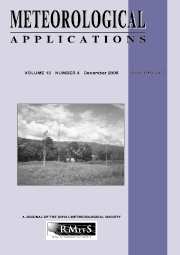Article contents
Meteorological situations associated with significant temperature falls in Buenos Aires: an application to the daily consumption of residential natural gas
Published online by Cambridge University Press: 01 September 1999
Abstract
The synoptic situations associated with significant temperature decreases in Buenos Aires are analysed. Knowledge of these situations for the winter season is very useful for the community, especially when they are related to the consumption of natural gas, which is one of the most important sources of energy in Argentina. The rotated principal component method is used to classify the synoptic situations. The significant temperature decreases in winter during the period 1980–1988 occur in five modes at 1000 hPa and three modes at 500 hPa. The relationship between the two levels identifies two dominant patterns. The first has a strong high-pressure system with a northwest-southeast axis and a maximum strength near 80° W, 40° S; this pattern is related to south-southeast winds over Buenos Aires. The second type shows a high-pressure system at 105° W, 48° S and a minimum near 110° W, 30°–35° S; this kind of pattern is associated with persistent blocking situations in the South Pacific which result in persistent winds from the south over Buenos Aires. In addition, a relationship between such situations and the resulting increases in the demand for natural gas in residential areas is shown. This will help in the forecasting of such events in the future.
Information
- Type
- Research Article
- Information
- Copyright
- © 1999 Meteorological Society
- 12
- Cited by

